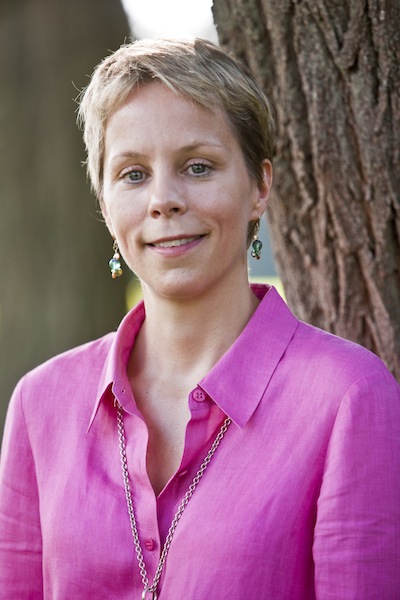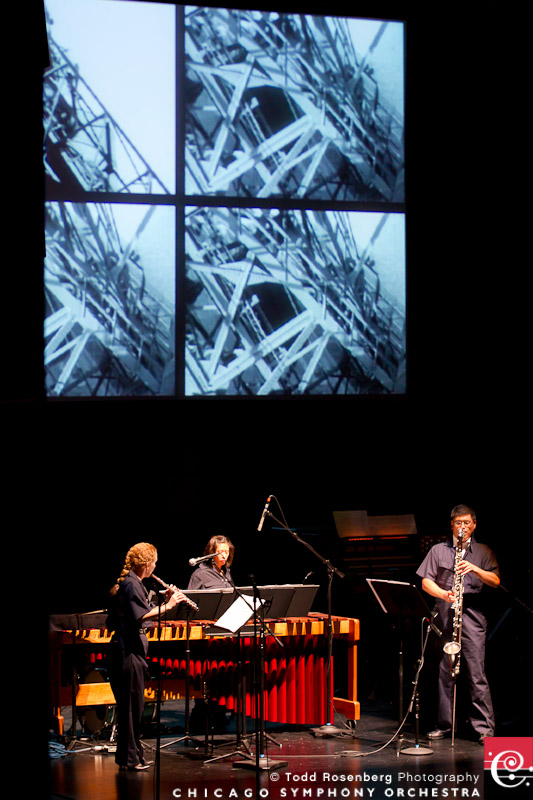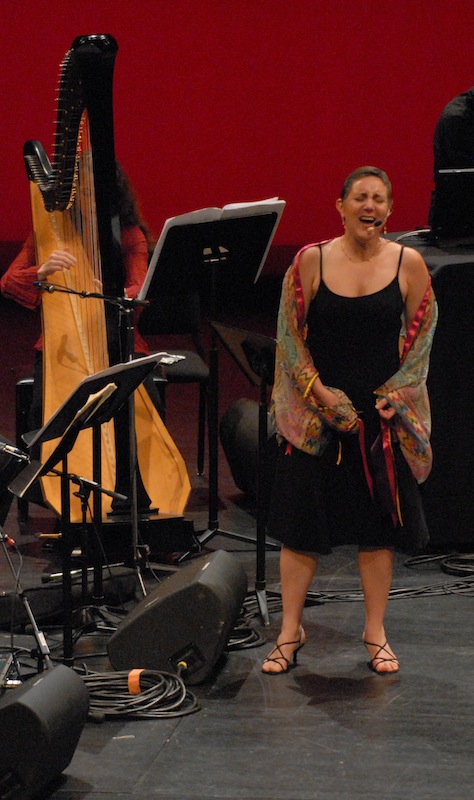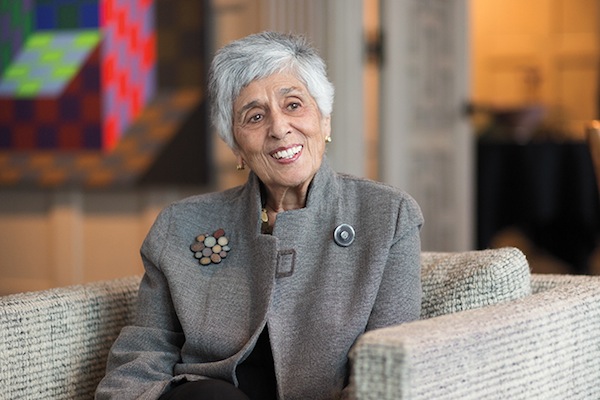MusicNOW series to lead off 20th anniversary season with a rich retrospective
MusicNOW–the Chicago Symphony Orchestra’s contemporary chamber series, which opens its 20th anniversary season Monday night–started small.
The first season consisted of just a single concert, a Wednesday evening performance Dec. 9, 1998, in Buntrock Hall. With its cinderblock walls and rows of folding chairs, the large rehearsal space in the CSO’s recently completed Symphony Center, offered all the charm and audience amenities of a suburban high school gym.
Hardly an inspiring venue. But what a concert—string quartets by Elliott Carter, Charles Ives and Conlon Nancarrow with the Arditti Quartet, a British ensemble renowned for their way with 20th century repertoire. Pianist Ursula Oppens performed Two Canons for Ursula, which Nancarrow wrote for her, and teamed up with the Arditti for quintets by Carter and Ives. The 300-seat space was sold out, the audience was thrilled, and MusicNOW was successfully launched.
For the next two decades, a succession of CSO composers in residence shaped MusicNOW. This season is the handiwork of Elizabeth Ogonek and Samuel Adams, who wrap up their three-year joint appointment in June. But the CSO’s first resident composer, John Corigliano, arrived in 1987, so MusicNOW’s season opener honors both anniversaries.
Monday night’s concert at the Harris Theater, features music by all seven former CSO composers in residence: Corigliano, Shulamit Ran, Augusta Read Thomas, Osvaldo Golijov, Mark-Anthony Turnage, Mason Bates and Anna Clyne. Three pieces are repeats from earlier MusicNOW programs: Bates’s The Life of Birds, Clyne’s Fits + Starts and Thomas’s Carillon Sky, which had its world premiere in April 2006.
Corigliano came to the CSO for a three-year residency sponsored by Meet the Composer, a national program that embedded composers with symphony orchestras across the country. When the CSO decided to continue the program on its own, it tapped Ran, who held the post from 1990 to 1997. She immediately began agitating for a contemporary chamber music series.
“I consider myself to be in the pre-MusicNOW era,” Ran recalled. “From the start of my residency, I had a very strong desire to establish a series of new music. But it was not yet the time to do it, partly because there was no Symphony Center yet. Nor was there a Harris Theater. There was only the very large Orchestra Hall or the very small Grainger Ballroom.” The $110 million, two-year construction project that vastly expanded Orchestra Hall into today’s Symphony Center was completed in 1997. The Harris Theater for Music and Dance, MusicNOW’s current home, opened in fall 2003.
Nonetheless, Ran, who won the Pulitzer Prize for music in 1991, advocated tirelessly for contemporary music. She suggested works by living composers for the orchestra’s subscription series and hosted lively pre-concert talks focused on new music. One of her memorable contributions was a multi-day event in fall 1992 titled “Oh Them Rats Is Mean in My Kitchen” exploring the connection between popular, folk and classical music.
By 1997 when Thomas succeed Ran, the time was finally right for a CSO new music series. Symphony Center was up and running. Composer-conductor Pierre Boulez, a regular guest in Chicago since 1991, was in his third season as principal guest conductor. Perhaps most importantly, Daniel Barenboim–the orchestra’s music director from 1991 to 2006–was avidly interested in new music. The CSO regularly commissioned world premieres for its subscription concerts.

“I felt really supported and empowered by Daniel and Pierre, and I threw myself into it,” said Thomas who spent nine years with the CSO. “It was so happening for that decade. The energy level was really high.”
Just as vital was the support Thomas received from CSO donors and board members, especially Cindy Sargent, Sally Hands and Joan Harris. Over the years the three contributed millions to support MusicNOW. (Joan Harris and her husband, Irving, were the driving force behind the Harris Theater for Music and Dance.)
“One important factor in all this is to really partner with the donors,” said Thomas. “I remember meetings with Joan Harris. I had a little presentation with handouts. I would say, ‘Here’s what I would do. Here are my sample programs: we’d have four concerts a year and four pieces on each concert, 16 pieces each year.’
“I had the whole thing mapped out for five years,” said Thomas. “Joan was so receptive. With something like MusicNOW, you have to start somewhere; you need an energizer bunny.”
“I have a mantra,” said Harris, a CSO life trustee who cheerfully describes herself as “a failed pianist. “‘If we don’t have new music today, we ain’t gonna have old music tomorrow.’ It’s that simple.”
Despite her commitment to contemporary music, Harris’s first $1 million for MusicNOW came with strings attached.
“Those were the days when we were sitting in Buntrock Hall,” said Harris, shuddering at memories of the room’s tacky, temporary stage half-heartedly decorated with a few plants. “My God, that was awful. It was an embarrassment.
“And,” she added, “in the beginning, it was the same 200 people every time, mostly local composers and a few music students. None of the CSO trustees got it; none of them understood what it was.”
Approaching Henry Fogel, then the orchestra’s president, about supporting MusicNOW, Harris made her wishes clear.
“I made a deal with Henry,” she said. “The deal was two things. One, if and when we get this [Harris} theater built, you’re going to move the series over there because that’s where it belongs. And two, if only the same 150 people are here in five years, that’s the end of it. You need to spend part of this money promoting it. So we moved it over.”
After six seasons performing either in Buntrock or on Orchestra Hall’s mainstage, MusicNOW relocated to the Harris Theater in 2003. “It’s never been wildly subscribed, but it’s always been a nice crowd,” Harris said. The move, she added “absolutely” raised MusicNOW’s profile and attracted new audiences.
Since that first concert by the Arditti Quartet, MusicNOW has morphed into an always adventurous, usually lively chamber-music mashup.
There have been some missteps. Bates and Clyne, composers in residence from 2010 to 2015, banished printed programs for a while, offering listeners live or video interviews with each program’s composers instead. Some of us, however, prefer to read detailed notes at our leisure rather than listen to sometimes-ponderous composers explain their music.
But the pluses outpaced the minuses. Each resident composer brings a different sensibility to the series, guaranteeing that audiences hear a wide variety of styles. Repertoire has ranged from the prickly dissonance of Elliott Carter to the lush, electronica-infused sounds of Mason Bates and just about everything in between.
There have been close to 30 world premieres, with three U.S. premieres coming this season. Today’s typical MusicNOW audience includes twenty-somethings attracted by the experimental sounds, casual vibe, and free post-concert pizza and beer. Seasoned CSO subscribers thirsting for something beyond Tchaikovsky and Brahms also turn up regularly.
MusicNOW has had its share of big-name performers. Barenboim appeared as conductor and pianist on two programs. Boulez conducted several concerts, some featuring his own music, and he led his Paris-based Ensemble InterContemporain on a MusicNOW concert in Orchestra Hall in November 1999. Other conductors have included Andrew Davis, David Robertson, Ludovic Morlot, Oliver Knussen, Pablo Heras-Casado and Esa-Pekka Salonen, who will lead a MusicNOW program in the spring.
But MusicNOW’s vitality comes, in part, from CSO musicians who have performed on the series since virtually Day One. Baird Dodge, principal second violin, has been a MusicNOW regular since 2000, John Bruce Yeh, assistant principal clarinet, since 2001. Cliff Colnot, MusicNOW’s principal conductor, has either conducted MusicNOW repertoire or prepared ensembles for visiting guest conductors since 2000.

Yeh has fond memories of performing Clyne’s steelworks, a piece for clarinets, piccolo/flute and percussion, with CSO colleagues Jennifer Gunn and Cynthia Yeh. The trio wore overalls and shared the stage with a video incorporating a 1936 industrial film titled Steel: a Symphony of Industry.
“It was this little trio by Anna Clyne,” said Yeh. “We dressed up in overalls and electrified our instruments. It was a very theatrical piece; I had all these honky low notes. We billed it as ‘Two Yehs with a Gunn.’ It was very hard-hitting, and the music was very athletic. The audience went wild.”
Brant Taylor, CSO cellist, relishes the chance to push beyond the traditional concert format.
“I noticed right away that it was a different concert experience,” he said. “You’re outside of Orchestra Hall, there are no printed programs, there are videos.” Taylor will reprise his 2014 performance of Clyne’s Fits + Starts for solo cello on Monday.
Dodge was featured in the 2006 world premiere of Thomas’s Carillon Sky, composed for solo violin and chamber ensemble, and he repeats the piece Monday. The son of a composer, he plays contemporary music as often as possible.
“If you only play Beethoven,” he said, “then your reference points for how to play it and what the music means will probably have to do with how other people have played Beethoven.
“But if you’re playing contemporary music, there’s no style to imitate. You just have the notes, just the score. You have to come to grips with what do these intervals mean to me, what do these rhythms mean? How do we bring this score to life? If you approach old music the same way, then you’re really recreating a work rather than just offering another interpretation of it.”
The learning process can work both ways. Clyne says that composing chamber pieces for CSO musicians sharpened her orchestral-writing skills. Bates and Adams happily experimented with the Harris Theater’s considerable video and audio resources.
But MusicNOW’s goal remains what it was 20 years ago when Thomas launched the series: bringing Chicago audiences the widest possible range of music being written today.
This season continues Nov. 13 with composer-pianist Vijay Iyer whose work erases boundaries between jazz and classical. April 2 brings the world premiere of Savior, a full-evening theatrical piece about the life of Joan of Arc by Amy Beth Kirsten, a MusicNOW commission. Esa-Pekka Salonen conducts the final concert May 21.
“There are so many things going on, things that can co-exist,” said Ogonek. “One of the most important things to Sam and me was to highlight the diversity of music that exists today, not only in the U.S. but also abroad. That’s hugely important. I love that idea.”
MusicNOW celebrates 20 years 7 p.m. Monday at the Harris Theater. cso.org; 312-294-3000.
Posted in Articles




